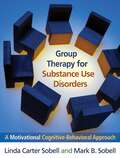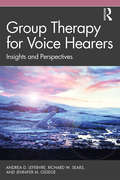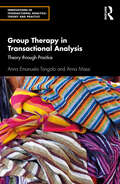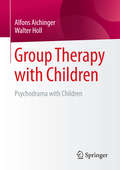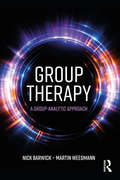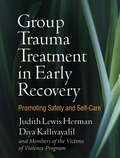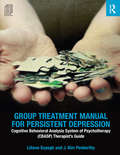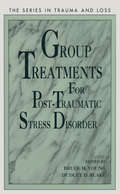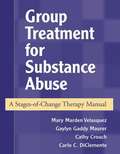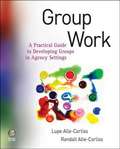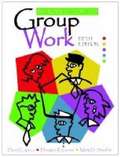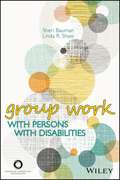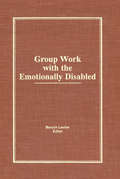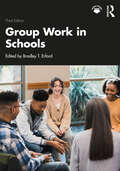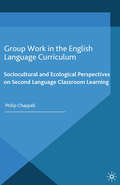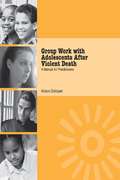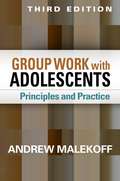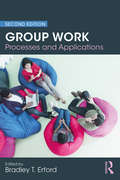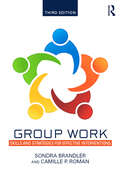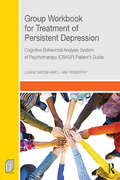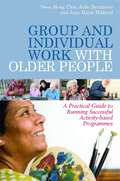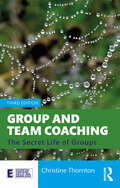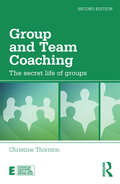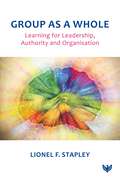- Table View
- List View
Group Therapy for Substance Use Disorders: A Motivational Cognitive-Behavioral Approach
by Linda Carter Sobell Mark B. SobellThis authoritative book presents a groundbreaking evidence-based approach to conducting therapy groups for persons with substance use disorders. The approach integrates cognitive-behavioral, motivational interviewing, and relapse prevention techniques, while capitalizing on the power of group processes. Clinicians are provided with a detailed intervention framework and clear-cut strategies for helping clients to set and meet their own treatment goals. More than two dozen ready-to-use reproducible assessment tools, handouts, homework exercises, and session outlines are supplied in a convenient large-size format.
Group Therapy for Voice Hearers: Insights and Perspectives
by Richard W. Sears Jennifer M. Ossege Andrea LefebvreBased on extensive interviews with expert facilitators from around the world and grounded in empirical evidence, Group Therapy for Voice Hearers includes numerous tips, strategies, case examples, and reflection questions to bring the material to life in a practical way. Chapters address the need for practical, accessible training in how to facilitate sessions and identify six key factors that lead to a successful session: safety, flexibility, empowerment, the integration of lived experience, self-awareness, and attention to the needs of the group process. This book is an important resource for mental health professionals working with clients who hear voices.
Group Therapy in Transactional Analysis: Theory through Practice (Innovations in Transactional Analysis: Theory and Practice)
by Anna Emanuela Tangolo Anna MassiTangolo and Massi offer a complete manual for transactional analysis (TA)-based group therapy. Group Therapy in Transactional Analysis demonstrates the evolution of TA as a relational psychodynamic therapy rich in clinical experiences both within individual and group settings. The authors outline how to select clients, which setting to provide, how to establish contracts, and which techniques to use during group sessions. The book includes a full assessment of research and theory, clearly demonstrating efficacy and taking into account neuroscientific studies on intersubjectivity and the social brain. This is combined with a practical approach which supports therapists from the very first steps to the analysis of more complex interpersonal dynamics and dream analysis in a group setting. Finally, future research directions are discussed, together with an overview of an experiment on online groups in the time of coronavirus. This foundational text will be a key reference for therapists in training and professionals new to the principles of transactional analysis. It will also be of interest to students on psychotherapy training and clinical psychology courses.
Group Therapy with Children
by Walter HollPeer groups have a great significance in children's development. Since children express their problems through play and action, Alfons Aichinger and Walter Holl have developed the basic ideas and intervention possibilities of psychodrama for group therapy work with children in a process spanning over 35 years. Using vivid examples, they describe the appropriate composition of a group of children, the structure of a group therapy session, the group process, disorder-oriented and group process-oriented interventions and the demands placed on the leaders of these groups.
Group Therapy: A group analytic approach
by Martin Weegmann Nick BarwickGroup Therapy: A Group-Analytic Approach is a comprehensive introduction to contemporary group analytic theory and practice - the prevailing form of group therapy in Europe. Highly accessible yet meticulously referenced, theoretically rich, yet clinically vivid, it is an invaluable resource for all interested in group therapy, providing access to the very heart of working therapeutically with(in) groups.
Group Trauma Treatment in Early Recovery: Promoting Safety and Self-Care
by Judith Lewis Herman Diya Kallivayalil and Members of the Victims of Violence ProgramInfused with clinical wisdom, this book describes a supportive group treatment approach for survivors just beginning to come to terms with the impact of interpersonal trauma. Focusing on establishing safety, stability, and self-care, the Trauma Information Group (TIG) is a Stage 1 approach within Judith Herman's influential stage model of treatment. Vivid sample transcripts illustrate ways to help group participants deepen their understanding of trauma, build new coping skills, and develop increased compassion for themselves and for one another. In a large-size format for easy photocopying, the volume provides everything needed to implement the TIG, including session-by-session guidelines and extensive reproducible handouts and worksheets. Purchasers get access to a companion website where they can download and print the reproducible materials from the book, as well as an online-only set of handouts and worksheets in Spanish. See also The Trauma Recovery Group, by Michaela Mendelsohn, Judith Lewis Herman, et al., which presents a Stage 2 treatment approach for clients who are ready to work on processing and integrating traumatic memories.
Group Treatment Manual for Persistent Depression: Cognitive Behavioral Analysis System of Psychotherapy (CBASP) Therapist’s Guide (100 Cases)
by Liliane Sayegh J. Kim PenberthyThis Cognitive Behavioral Analysis System of Psychotherapy (CBASP) Group Manual is a treatment guide for mental health professionals working with persistently depressed individuals. The manual provides a clear step-by-step application of CBASP as a group treatment modality, the research findings supporting the effectiveness of this treatment, and suggested methods of assessing outcome as well as possible applications or adaptations of the treatment to different settings and disorders. This manual is accompanied by a separate workbook for patients.
Group Treatment for Post Traumatic Stress Disorder: Conceptualization, Themes and Processes (Series in Trauma and Loss)
by Young Bruce H. Blake Dudley D.Group Treatment for Post Traumatic Stress Disorders is a collection written by renowned PTSD experts who provide group treatment to trauma survivors. The book reviews the state-of-the-art applications of group therapy for survivors of trauma such as: rape victims, combat veterans, adult survivors of childhood abuse, motor vehicle accident survivors, trauma survivors with co-morbid substance abuse, survivors of disaster, families of trauma survivors, homicide witnesses and survivors, and disaster relief workers.This book a unique contribution to the field. Each chapter provides a detailed and comprehensive description of state-of-the-art group treatment and artfully combines scholarly review with a step-by-step summary of treatment rationale and methods. Furthermore, the book covers a wide scope, typically found only in large, multi-volume compendia.Group Treatment for Post Traumatic Stress Disorders is ideal for clinicians, aspiring clinicians, researchers and educators. It provides a unique and eminently readable summary of group therapy applied to increasingly recognized clinical populations.
Group Treatment for Substance Abuse
by Gaylyn Maurer Mary VelasquezThis practical manual presents a 29-session treatment program designed to engage, motivate, and stimulate processes of change in clients at all stages of recovery. The program is based on the research-supported transtheoretical model of behavior change. The manual describes skills-building activities and interventions that are likely to be most effective with clients as they cycle from the earlier stages of change precontemplation, contemplation, and preparation to the later stages, action and maintenance. Each of the structured sessions is presented in a consistent, highly accessible format, including a clear rationale, summary of objectives, and overview of the main activities that will take place. Step-by-step guidelines for implementation are provided, as well as strategies for using a motivational interviewing style. The manual is complete with all needed handouts and exercise forms, ready to photocopy and distribute to clients. Ideal for use with groups, the approach can easily be adapted to individual treatment.
Group Work
by Lupe Alle-Corliss Randall Alle-CorlissThorough, hands-on guidance for conducting group work in nonprofit, public, and for-profit agency settings.Because it improves access, is cost-effective, and can be modified to conform to evidence-based practice, group work has become the treatment approach of choice in a broad range of human service agencies. Written in an approachable manner that allows for direct translation of concepts into practice, Group Work: A Practical Guide to Developing Groups in Agency Settings provides a dual emphasis on clinical group skills along with a thorough understanding of agency systems that is necessary to meet the demands of today's practice settings.Written by two experts in the field, this book offers:Practical, detailed, ready-to-use group treatment plans, including group objectives, weekly session guidelines, discussion topics, activities, relevant research, and other essential toolsCoverage of the three major types of agencies--nonprofit, public, and for-profit--supported by research and evidence-based treatments that reflect practitioners' actual experiencesA unique agency perspective that includes coverage of agency structure, policies, history, staff, politics, informal and formal norms, and diverse client populationsGroup Work also contains a resourceful CD-ROM with over fifty different Group Profiles that can be customized to suit clients' unique styles and needs. Addressing a wide variety of psychological issues frequently encountered in therapy work with groups,¿the Group Profiles cover a range of clients across the lifespan--children, adolescents, adults, older adults, and the medically ill. Topics covered in these Group Profiles include anxiety, depression, divorce adjustment, substance abuse, foster care, trauma, chronic pain, anger management, hospice, weight management/obesity prevention, teen pregnancy, HIV/AIDS, and many more.Clear, concise, and current, Group Work: A Practical Guide to Developing Groups in Agency Settings is a useful resource from which professionals will gain the knowledge, skills, and awareness of the many intricacies involved in working with diverse groups within different agency settings. Its easy-to-follow presentation will enable all mental health professionals to successfully apply a variety of concepts, ideas, and skills into their group work practice.Note: CD-ROM/DVD and other supplementary materials are not included as part of eBook file.
Group Work (Fifth Edition)
by David Capuzzi Douglas R. Gross Mark D. StaufferThis book provides counselors in educational, mental health, private practice, and rehabilitation settings practical guidelines for facilitating groups. This text goes beyond the adaptation or application of theories of individual counseling to the group work setting. New to the fifth edition are updated chapters addressing ethical/legal considerations in group work, as well as diversity issues in group work. This edition also has an updated section entitled "Group Work in Selected Settings," which includes chapters on groups in schools, mental health, and rehabilitation settings. Readers will find these changes to be of high interest and helpful in developing an appropriate knowledge and skills base for group work. In addition, this text includes chapters on the specialty groups (task, psychoeducational, and psychotherapy) identified by the Association for Specialists in Group Work (ASGW), which complement and extend the information included in the chapters covering professional issues related to group work. Special Features A comprehensive overview of major issues connected with group work Study guide - Links below A combination of research, theory, and practice information Case studies
Group Work With Persons With Disabilities
by Sheri Bauman Linda R. ShawThis one-of-a-kind manual provides direction for leading groups of people with disabilities or groups that have members with disabilities. Viewing disability as a single aspect of a multifaceted person, Drs. Bauman and Shaw share their insight and expertise and emphasize practical skill building and training for facilitating task, psychoeducational, counseling, family, and psychotherapy groups across various settings. Topics examined in Part I include common themes in groups that focus on disability; various group formats, including groups using technological platforms; issues of diversity that exist simultaneously with ability; group composition; ethical concerns; and training considerations and logistical accommodations. Part II focuses on group counseling with clients experiencing sensory, psychiatric, cognitive, and physical disabilities as well as chronic medical conditions. A list of resources, support information, and group exercises completes the book. *Requests for digital versions from the ACA can be found on wiley.com. *To request print copies, please visit the ACA website here. *Reproduction requests for material from books published by ACA should be directed to permissions@counseling.org
Group Work With the Emotionally Disabled
by Baruch LevineHere is an exciting and informative volume on the use of social group work in psychiatric settings. As it affirms the significance of social group work’s clinical potential, Group Work With the Emotionally Disabled fosters further development in this highly specialized area of human service.Baruch Levine, a prestigious social group worker and clinical theorist, has edited this exceptional volume that emphasizes the coexistence of mental illness and mental health in effective group experiences for treating mental disability. Readers are treated to a comprehensive history of the development of the use of social group work practice with the emotionally disabled in psychiatric settings. Other authoritative chapters focus on the practice aspect and explore the problems and issues in group work with the emotionally disabled, the settings for group treatment of the chronically ill and psychiatrically at-risk, and the development of comprehensive approaches to the treatment and rehabilitation of persons with severe mental illness.
Group Work in Schools
by Bradley T. ErfordSchool counselors are often the only employees in school settings with any formal education in group work, and yet their training is typically a general course on how to run groups. Group Work in Schools provides an alternative training model; one that presents exactly what counselors need to know in order to successfully implement task-driven, psychoeducational, and counseling/psychotherapy groups in any educational setting. Additions to this newly updated second edition include: discussion topics, activities, case examples, integrated CACREP standards and learning outcomes, as well as an overall update to reflect the most recent research and knowledge.
Group Work in Schools
by Bradley T. ErfordThe third edition of Group Work in Schools is designed to prepare counselors in school settings to successfully implement task, psycho-educational, and counseling groups in public and private educational settings. The chapters of this book are written by experts in the counseling profession and cover foundational, systemic, and applied topics essential to training top-caliber school counselors. Providing state of practice information and case examples that help readers see how theory translates to practice in the field, additions to this newly updated third edition include discussion topics, activities, case examples, practitioner perspectives, and integrated CACREP (2024) standards and learning outcomes, as well as an overall update to reflect the most recent research and knowledge, including pandemic coverage and advances in technology. Updated comprehensively and thoughtfully and featuring a wide range of contributor perspectives, the much-anticipated third edition of this book is essential reading for school counselors-in-training.
Group Work in the English Language Curriculum
by Philip ChappellThis book explores how using small groups in second language classrooms supports language learning. Chappell's experience as a language teacher equips him to present a clear, evidence-based argument for the powerful influence group work has upon the opportunities for learning, and how it should therefore be an integral part of language lessons.
Group Work with Adolescents After Violent Death: A Manual for Practitioners
by Alison SalloumThis manual for facilitators of teen grief groups and other mental health professionals, addresses the unique needs of adolescents experiencing traumatic reactions in the aftermath of violent death. Including information on all types of violent death, this practical guide addresses issues of violence, trauma and loss including sections on logistics, screening, evaluation, consent, facilitators and parents.
Group Work with Adolescents, Third Edition
by Andrew MalekoffA trusted course text and professional resource, this comprehensive book delves into all aspects of planning and conducting strengths-based group work with adolescents. In an accessible, down-to-earth style, Andrew Malekoff spells out the principles of effective group practice. Extensive clinical illustrations show how successful group leaders engage teens in addressing tough issues--including violence, sexuality, prejudice, social isolation, and substance abuse--in a wide range of settings. Normative issues that adolescents face in the multiple contexts of their lives are lucidly explained. Packed with creative ideas and activities, the book helps readers develop their skills as confident, reflective practitioners. New to This Edition *Significantly revised chapters on group work essentials, school-based practice, and trauma. *Additional topics: social media and cyberbullying, expressive and animal-assisted therapies, mindfulness, adolescent brain development, and more. *Updated practice principles, information, and references. *Numerous new practice illustrations.
Group Work: Processes and Applications (2nd Edition)
by Bradley T. ErfordThe overriding theme of Group Work: Processes and Applications is a focus on the specialized group work that counselors perform from a systemic perspective in a multicultural context. This text briefly covers traditional theoretical approaches, focusing more on the techniques and applications of the approaches, but the core of the text involves the systemic approach to group work: preparing group leaders to facilitate the systemic group process, from planning the group through the four stages of group work: forming and orienting, transition, working, and termination. The content is aligned with 2016 CACREP standards. Numerous other techniques, covered, are linked with specific theoretical orientations. PowerPoints and Instructor’s manual are available.
Group Work: Skills and Strategies for Effective Interventions
by Sondra Brandler Camille P. RomanThe new edition of Group Work adds a focus on diversity and the use of self in group work, an area too often neglected in professional training but essential to meeting current competence standards set by the Council on Social Work Education. As in previous editions, students and professors will find thoughtful analyses of complicated value dilemmas and specific techniques for use in a diverse range of settings, including confrontations and situations where humor is appropriate. Complete with more games and exercises, an updated discussion of values and ethics, and an expanded skills section, Group Work also contains excerpts and discussions of case studies that can be applied to students’ own experiences and will serve as a valuable references for years to come.
Group Workbook for Treatment of Persistent Depression: Cognitive Behavioral Analysis System of Psychotherapy-(CBASP) Patient’s Guide
by Liliane Sayegh J. Kim PenberthyThe Group Workbook for Treatment of Persistent Depression is a guide for patients suffering from persistent depression who participate in group therapy. The workbook provides handouts and skills training that require the help of a trained professional to teach and animate in a group format. Patients will be able to maximize their acquisition of emotion coping skills by using this book in conjunction with Group-CBASP sessions.
Group and Individual Work with Older People
by Swee Hong Chia Julie Heathcote Jane Marie HibberdBeing active is fundamental to a person's sense of physical and mental wellbeing, and the need to engage in purposeful and meaningful activity does not diminish with age. However, common effects of ageing, such as reduced vision and hearing, arthritis, dementia, and in some cases social isolation, can affect an older person's ability to participate in therapeutic and recreational activities. Introducing the concept of PIE (Planning, Implementation and Evaluation), this practical resource will enable professionals working with older people to initiate and run successful activity-based programmes with their clients, either individually or in groups. The authors guide the reader through the processes of group and individual work, and provide step-by-step instructions for a range of activities, including arts and crafts, music, drama, movement, relaxation, reminiscence, and day-to-day tasks such as taking care of personal hygiene and preparing food and drinks. The book also describes the importance of assessing and evaluating activity-based work, with examples of completed evaluation and assessment forms. Useful case studies and self-reflective activities for the facilitator are included throughout. This book will be an invaluable for occupational therapists, creative arts therapists, health and social care practitioners and all other professionals working with older people.
Group and Team Coaching: The Secret Life of Groups (Essential Coaching Skills and Knowledge)
by Christine ThorntonGroup and Team Coaching is a best-seller offering a new perspective on the ‘secret life of groups’, the subconscious and non-verbal processes through which people learn and communicate in groups and teams. Originally published in 2010 and designed for easy navigation, it is a highly regarded team coaching handbook, and required reading on many courses.This new edition is fully updated, with a completely new chapter on working with groups and teams on virtual platforms, including hybrid and blended working. Christine Thornton uses key concepts from psychology, group analysis and systems theory as well as her own extensive experience to give practical advice. Topics include: the invisible processes of group dynamics; common dilemmas; pitfalls of team coaching and how to avoid them; pros and cons and best practice online; how to design coaching interventions; supervising coaching; ethics.Based on research and including many vignettes and case studies, this new edition is essential reading for coaches working with groups and teams, and leaders working with their own teams or commissioning coaching.
Group and Team Coaching: The secret life of groups (Essential Coaching Skills and Knowledge)
by Christine ThorntonGroup and Team Coaching offers a new perspective on the ‘secret life of groups’, the subconscious and non-verbal processes through which people learn and communicate in groups and teams. Updated with new research and including a wealth of vignettes and case studies, it will be essential reading for coaches who work with groups and teams as well as leaders commissioning coaching; the second edition features new guidance for leaders and managers, an updated introduction and new expanded practical sections on working with teams, working on the phone, and supervising and being supervised. The author uses key concepts from psychology, group analysis and systems theory as well as her own extensive experience to give practical advice, including: The invisible processes of group dynamics Pitfalls of team coaching and how to avoid them How to design coaching interventions Common dilemmas Ethics and supervision.
Group as a Whole: Learning for Leadership, Authority and Organisation
by Lionel F StapleyThe focus of this volume is on groups. The intention is to go beyond taking things at face value by going deeper and exploring the underlying, less evident phenomena concerning groups which occur beneath the surface. The more frequently used approach is to study the behaviour of individuals in a group to create an understanding of group behaviour. The approach taken here is to study groups from the perspective of the group as a whole, which provides a totally different perspective. Thus, while individual actions and relationships in groups is a valid field of study, the group as a whole is another level and unit of study. The book begins with pre-conference activity, particularly the need for 'authority', and a discussion on the importance and understanding of the group as a whole. The subsequent chapters follow the usual structure of IGO group relations conferences (GRCs). The aim is to develop a deeper understanding of group relations learning. This is in no way a substitute for the vital learning from experiential opportunities provided by actual GRCs. By attending, we are able to learn from the way(s) we take up our roles or are mobilised by the group to take up roles, and to understand that our valency can result in us being used repeatedly in the same way. The learning is rich and valuable because it happens in the here and now in direct experience. The book is the perfect guide to group relations conferences for experienced and novice participants alike to enhance their group relations learning experiences. It serves as an excellent introduction to GRCs for the novice and is ideal for those who have attended GRCs to explore their own experiences and emotions. The learning opportunities provide powerful insights to individuals and other group members. Everything that happens at a GRC is done for the learning of the members.
